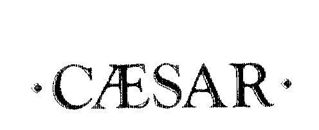In Ceramiche Caesar S.p.A. V Caesarstone Ltd [2020] FCAFC 124 (28 July 2020), the Full Federal Court overturned the Primary Judge's finding of honest concurrent use, given the evidence demonstrated use of goods that had been expressly excluded from the application, and finding of prior continuous use, on the basis that the prior use had not been authorised use under the control of the trade mark owner.
Background
Since 1988, Ceramiche Caesar, an Italian manufacturer of ceramic tiles for indoor and outdoor flooring and wall cladding, promoted, manufactured and sold tile products in Australia. In 2004, Ceramiche Caesar filed an application cover "ceramic tiles for indoor and outdoor use" for the following mark, which then proceeded to registration:

Since 1987, Caesarstone, an Israeli company, manufactured and sold large quartz slabs around the world. From 2003, Caesarstone sold large slabs in Australia through two distributors which then on-sold them to stonemasons. The stonemasons converted the slabs into finished products for sale to Australian consumers.
In 2005, Caesartone applied to register the word mark CAESARSTONE for "tiles, panels for floors, floor coverings, wall cladding, flooring, and ceilings; non-metallic covers for use with floors and parts thereof; profiles and floor skirting boards". The Examiner raised an objection to registration on the basis that it was deceptively similar to Ceramiche Caesar's earlier mark under section 44 of the Trade Marks Act 1995 (Cth).
Exclusion of tiles
To overcome the objection, Caesarstone removed tiles from its application by inserting the exclusion "none of the foregoing being in the nature of tiles" and the application proceeded to acceptance.
Ceramiche Caesar was concerned that Caesarstone was attempting to extend its scope of protection to flooring and wall cladding in Class 19 and opposed the Caesartone application. The dispute was therefore whether Caesarstone should enjoy registered trade mark rights for tiling for floors and walls
In Ceramiche Caesar's opposition to the CAESARSTONE application, Caesarstone relied on evidence of honest concurrent use of the mark to defend its application. The Delegate concluded that the marks are deceptively similar and did not find "honest concurrent use" and/or "other circumstances" warranting acceptance of Caesarstone's application.
Caesarstone appealed the Delegate's decision and the Primary Judge, overturning the Delegate's decision, found "honest concurrent use" on floor panels and wall cladding. This is despite finding that the goods in use fell within the meaning of "tiles". The Primary Judge allowed Caesarstone's application to proceed to registration (subject to certain condition or limitation to the scope of goods).
Full Federal Court Decision
On appeal before the Full Federal Court, the two principal issues were:
(1) whether there was honest concurrent use of the CAESARSTONE mark in class 19 goods; and
(2) whether prior use of the CAESARSTONE mark was authorised use under Caesarstone's control.
Honest concurrent use were all "in the nature of tiles"
The Full Court found that "[a] finding of honest concurrent use must be a finding of use in respect of goods that are in fact specified in the trade mark application". The Primary Judge found honest concurrent use on goods "in the nature of tiles", which were expressly excluded from the application. Accordingly, the Full Court held that the Primary Judge erred in finding honest concurrent use, found Ceramiche Caesar's earlier mark operated as a barrier to registration and therefore determined the CAESARSTONE application should not proceed to registration.
Authorised use
The Full Court overturned the Primary Judge's decision on this issue as well, holding that there had not been prior continuous use of the mark in Australia.
- Caesarstone had not itself sold any of the goods specified in the application in Australia. It had only solid large slabs (being the raw material) to its distributors, which were on-sold to stonemasons, who had used them to create the relevant designated goods. The skill and craftsmanship of the stonemasons determined the quality of the designated goods.
- There was no basis to infer control over the distributors' use of the mark because they were unrelated parties to Caesarstone.
- Caesarstone had not exercised quality control over the distributors' use of the mark or the stonemasons' use of the mark:
- there were no brand guidelines or marketing approval mechanisms in place;
- there were no quality control standards or any evidence Caesarstone had ever conducted any quality control;
- the product manuals that Caesarstone had supplied to the distributors were expressed to be optional;
- Caesarstone had no inspection rights;
- there was no evidence that Caesarstone had ever inspected any stonemasons' work; and
- Caesarstone had no contractual relationship with the stonemasons.
As such, there had been no prior continuous use of the mark in Australia.
Key takeaways
- Vigilantly monitor the Trade Marks Register.In particular, monitor your competitor's filings to ensure that the proposed scope of protection does not extend into your field of business (or future business field).
- Be careful what you exclude from your application.Removing conflicting goods/services may overcome an earlier mark objection at examination. However, if you nonetheless use your mark on those excluded goods/services, you may be infringing third party rights and may not be able to rely on that use to establish honest concurrent use.
- Honest concurrent usemust be in relation to goods/services specified in your trade mark application. Honest concurrent use of goods/services similar to the goods in your application will not be enough.
- Authorised use(including for the purposes of establishing prior continuous use) requires actual control to be exercised as a matter of substance over the use of the mark in relation to the relevant goods/services specified in the application. In this case, Caesarstone did not have or exercise control over the stonemasons who created the designated goods using the raw material supplied by Caesarstone's distributors.
The content of this article is intended to provide a general guide to the subject matter. Specialist advice should be sought about your specific circumstances.



